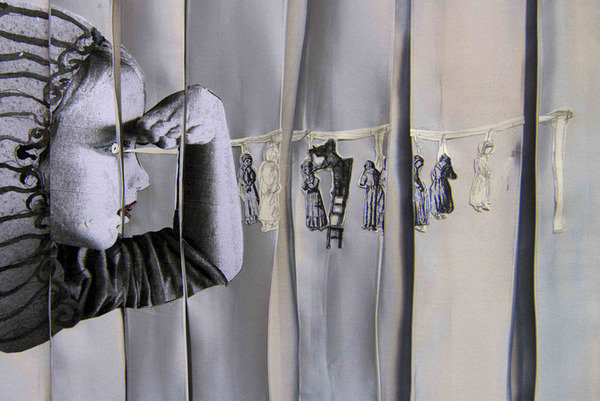26/4/2012
Alice Creischer
Kow, Berlin
The Establishment of Matters of Fact. Creischer's multipart installation for Kow illustrates that the normative power of the factual constitutes a regime in its own right, one that is permeated by domination and politically obscene.

"The Establishment of Matters of Fact" was the guiding principle of the early empirical sciences. They brought a new power into the world: the power of fact. Truth was to become manifest in the scientific experiment as though of its own accord: unaffected by regimes of belief, unconstrained by the interests of the ruling powers. In short, pure fact. For her exhibition, the Berlin-based artist, writer, and curator Alice Creischer, who was born in 1960, has mistranslated this central motto of the seventeenth century: "Das Etablissement der Tatsachen." If this title sounds vaguely disreputable, that is very much intended: Creischer’s multipart installation for KOW illustrates that the normative power of the factual constitutes a regime in its own right, one that is permeated by domination and politically obscene.
At the center of the exhibition stands the matter-of-factly reconstruction of a vacuum pump the scientist Robert Boyle, a founding member of the Royal Society, used in the 1660s to prove the existence of a vacuum, or the absence of air from a space. His claim led to a dispute with the political theorist Thomas Hobbes: Boyle intended to arrive at true propositions with the assistance of technical implements and "modest witnesses" (neutral observers); Hobbes, by contrast, insisted that even scientific insight had to submit to the power of the absolute ruler, the "Leviathan", and rejected Boyle’s experiments. If the existence of a vacuum could be proven by experimental means alone, without regard for the laws of pure reason and political philosophy, this space would be exempt from government control and, Boyle feared, might provoke a political vacuum as well, i.e., anarchy and civil war.
Boyle prevailed. He expended immense efforts to make his vacuum pump leak-proof enough that it could be used to suffocate lab mice. Far from creating anarchy, he invented the death in the laboratory as a demonstration of physical fact that could be reproduced before witnesses. The family trees, scientific classifications, and genetic codes of countless generations of lab mice serve Creischer to hang parts of her installation, which idiosyncratically short-circuits Boyle’s experimental arrangement with present-day political events and denounces the illusion of a knowledge isolated from power. Creischer guides the visitors through a dense sequence of images, collages, objects, and encoded poems; the exhibition also features a dramatic script in four acts that comes with a critical apparatus—an appendix that is as detailed as it is hard to read.
Encryption and the deliberate withholding of information are the defining characteristics of the exhibition’s semantics. Here, too, to understand is to appropriate. Knowledge is not something we just find. What can be known and what cannot is subject to conditions—for the one who speaks and the one who listens. No fact is innocent; neither is the knowledge of it, nor its critique. Creischer observes as the critical zeitgeist establishes new Leviathans, and she refuses to comply. Her exhibition remains deliberately fragile, both in its means and in its assertions. She addresses political matters of the present against a backdrop of profound familiarity with the early history of capitalism and its ties to the rational universalism of the Enlightenment as well as the shared presumptions both have been guilty of ever since—but everyone furnishes his or her own "Establishment of Matters of Fact", as well as its deconstruction.
As a theorist and art critic, Alice Creischer has staked out an influential position in the theoretical and political discourse of the German arts scene since the 1990s. Her art, however, has been fairly rarely on display in Berlin. She has long been a regular writer for Texte zur Kunst and springerin. As a curator, she has worked on important exhibitions around the critique of neoliberalism and colonialism: "Violence Is at the Margin of All Things" (2002), "ExArgentina" (2004), and "The Potosí Principle" (2010–2011). Solo shows at art institutions have featured Creischer’s work in conceptual art, painting, and sculpture. In 2007, she participated in documenta 12. We now present Alice Creischer’s first solo exhibition at a gallery.
Image: © Alice Creischer, 2012
Opening april 27th
Kow Berlin
Brunnenstrasse 9 D-10119 Berlin
Open wed-sun 12-18



